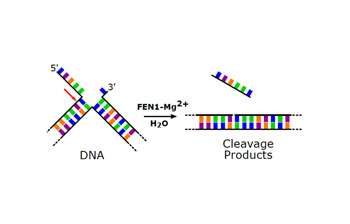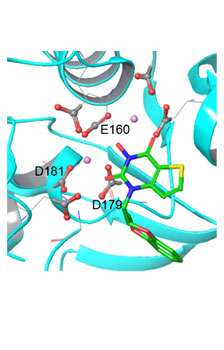Blocking a human branched DNA enzyme offers new ways of targeting a crucial enzyme family for cancer

An international team of scientists has discovered how compounds block flap endonuclease 1 (FEN1) - a crucial enzyme class in the DNA damage response and potential target for cancer treatment.
Branched or flapped DNAs with single stranded ends are formed during healthy human DNA replication and DNA repair.
These single-stranded flaps can be removed by enzymes such as flap endonuclease 1 (FEN1) to restore the integrity of the DNA to its double-stranded state.
Higher levels of FEN1 have been seen in cancer cells with clinically worse prognosis3 and these cells are more reliant on this repair enzyme especially in the absence of other supporting DNA damage response proteins.
These latter cells are sensitive to and die when FEN1 is blocked – a term called synthetic lethality. Preventing the action of enzymes like FEN1 maybe a way of selectively killing such cancer cells.
The collaborative, interdisciplinary team of scientists from the University of Sheffield, Pelago Bioscience and AstraZeneca took detailed images of the way previously confirmed inhibitors4 bind and block FEN1 to provide clues as to how the functionality of the protein is prevented.
This was complemented by detailed studies of the effects of inhibition of FEN1 on cell function within the DNA damage response.

Professor Jane Grasby from the University of Sheffield's Department of Chemistry led the research team whose findings are published today (Monday 15 August 2016) in Nature Chemical Biology.
"We have worked on understanding the secrets of FEN1's role in human DNA replication and repair for many years," said Professor Grasby.
"It's been an exciting privilege for us to work with AstraZeneca and apply this knowledge to potentially intervene in a serious human disease."
At AstraZeneca, the collaboration was led by Dr Steve Durant, Dr Cliff Jones and Dr Willem Nissink from AstraZeneca's Innovative Medicine & Early Development Biotech Unit.
Dr Durant said: "This has been a fantastic collaboration between us, the University of Sheffield and the Biotech company Pelago.
"It has really boosted our understanding of how a specific set of compounds we previously confirmed as FEN1 inhibitors work. This insight helps us develop ways of blocking nucleases, a crucial family of enzymes in the cellular DNA Damage Response and one of AstraZeneca's key strategic areas of focus in Oncology drug development."
More information: Jack C Exell et al. Cellularly active N-hydroxyurea FEN1 inhibitors block substrate entry to the active site, Nature Chemical Biology (2016). DOI: 10.1038/nchembio.2148
Journal information: Nature Chemical Biology
Provided by University of Sheffield



















